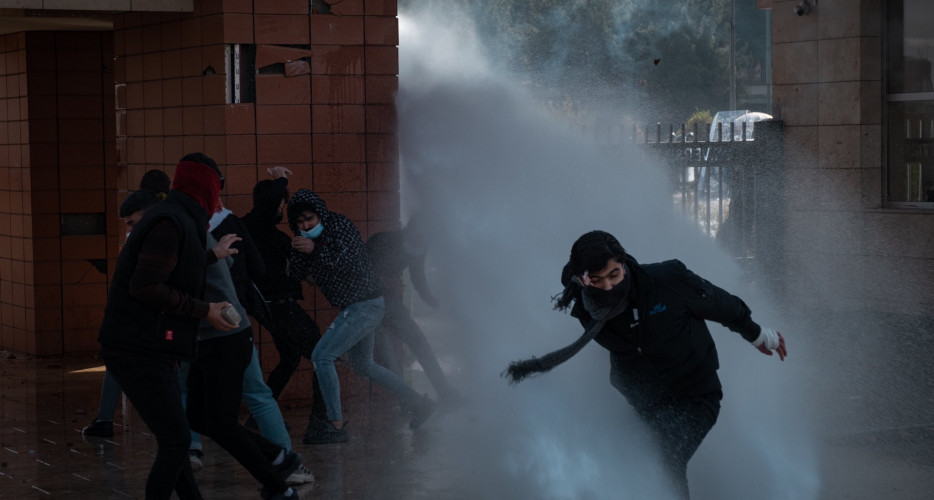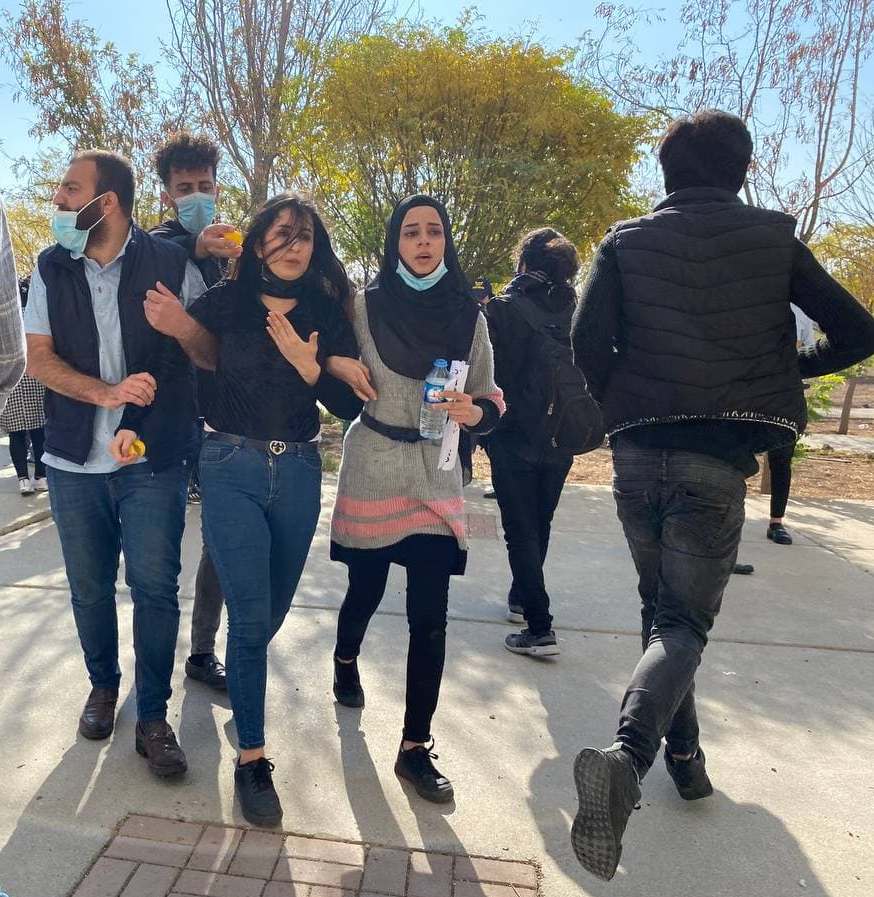
PEREGRAF
Throughout his three years in university, Mohammed was able to afford a proper meal at the university’s cafeteria only a couple of times, and his only trips were to his parents’ house once a month.
Mohammed’s destitution was worsened with a lack of government support – not only is he not able to enjoy his young years like his classmates, but he is also deprived of the most basic rights.
This derived him and his friends at university to take to the streets of Sulaimani city on Monday and continued for several days. They initially started out asking for their student allowances that have been cut since 2014 as part of the Kurdistan Regional Government’s (KRG) measures to deal with an economic crisis – but their problems are much more than that, protesters say.
"Our financial situation is very bad; we are a nine-member family, and our only source of livelihood is my father's labor, and he is old so I decided to quit education, but donors helped and that’s how I finished my first," Mohammed told Peregraf.
His father has seven children to provide for, but more than anyone else in the family, Mohammed needs it the most considering he is a university student and has to travel hours from Ranya to Sulaimani for his education.
"The second year of university, education was suspended due to Coronavirus and classes were online, which was a good opportunity for me to study at home and not go to the dormitories to put extra pressure on the family," he said.
Mohammed is now in his third year. Although he has continued to work hard physical labor and study for the past two years, he has not been able to go to the university cafeteria more than a couple of times for meals – he has eaten a simple falafel sandwich that cost 500 Iraqi dinars (around $3.4) and visited his family once a month.
He said the reason for the current protests is that the government's financial situation has improved and that allowance can be spent, because classes are on campus again which will cost students more.
"We are asking for our legitimate rights and we want the government to give us our allowances so that we can continue our studies," he said, denying that there was any party or side behind their protests.

A number of students at the university of Sulaymaniyah faced health issues due to tear gas. Nov 24, 2021. Photo: Briar Namiq.
Protests spread out to the heart of the city on Tuesday and no longer stayed by the gate of Sulaimaniyah’s public universities.
Security forces confronted the youth on Salim Street, where the office of the province’s ruling party, The Patriotic Union of Kurdistan (PUK) is located. The tension broke out, tear gas smoke filled up the streets and stones were flying.
Clips from the protests quickly made it to social media. In one of the videos, an official in civilian clothes is seen kicking a young man in the head hard who was arrested and thrown to the ground by several men in uniforms, one of whom takes the first chance he gets to punch the protester.
Other videos of female students chased down and arrested, and violence against protesters circulated on social media.
The next day, on November 24, protests continued and this time police heavily used tear gas on students at the University of Sulaimaniyah, many students and journalists were affected, some were rushed into ambulances for treatment.
On the fourth day, people were angrier, in some areas others joined the students’ protest to voice that anger. Protests were held in Sara Square in downtown Sulaimaniyah, a symbolic place where the February 17, 2011 protests were held – a place authorities have been afraid that protests will erupt there.
In several districts and provinces, the youth closed main streets in the bazaar, set fire to several parties and government buildings and offices.
At the time of the tensions, the KRG’s council of ministers was holding a meeting, one of their topics of discussion was the demands of protesting students who had been on the streets for four days. The government did not decide to reinstate those allowances, but to allocate a budget to the Ministry of Higher Education and Scientific Research for the demands and needs of students.
Hassan, another university student from Khurmal village who goes to Sulaimaniyah University, says his family's livelihood depends on farming and it is "very bad."
"Donors and friends help with my expenses. If it isn’t for them, I can't go on for one day, I eat at my friends’ homes every day, because I can't cover dormitory expenses," he said. He receives a scholarship from an organization for his studies.
The allowance is 60,000 dinars for local students, 100,000 dinars for students outside the city, but the government has not given the money for seven years due to what they said as because of the financial crisis.
The parliament supported their demands. Forty-eight signatures were collected by parliamentarians to re-instate the allowance, and 71 parliamentarians called for a special meeting on the issue, but parliament has been unable to decide or force the government to reinstate allowances.
"People's situation is bad and giving students the allowance is a lot and can fill in for some of their needs," said Ashna Abdullah, a member of the Education and Higher Education Committee in parliament. "These officials in the region think however they are living, it’s the same for other people."
.jpg)
Health teams treat the students at the University of Sulaymaniyah. Nov 24, 2021. Photo: Briar Namiq.
The MP criticized the parliament's presidency and believes it "does not play their real role" in this issue.
"There are 130,000 students in the institutions and universities in the [Kurdistan] Region. It is not clear how many of them are staying in the dormitory, whose allowances are 100,000 dinars and how many are students in cities which are 60,000 dinars, but in any case, they [government] will need 10 billion dinars," she said.
Students who are staying in dormitories have too many problems to count.
"There are girls who wash the clothes of all their roommates in the dormitory so that they won’t pay the room rent, and there are boys who do cooking and all the chores in the dormitory so they don't pay for their needs," a university student told Peregraf on the condition of anonymity.
Officials and political parties, as well as the government has shown support for the students’ demands, but this hasn’t satisfied students and they want to see work done in action. They are yet made angrier as clips of violence and beating published online, which was widely condemned by the public.
Security forces have steered clear of the beatings. Sulaimaniyah’s Security Council promised to "punish" those who, according to them, are not students and are trying to sabotage the protests, and the government has promised to investigate those who have inflicted violence.
.jpg)
The security forces used tear gas against the demonstrators at The University of Sulaymaniyah. Nov 24, 2021. Photo: Briar Namiq.
"The security forces will arrest those who are not students and are participating in the protests to turn it violent," a senior security source told Peregraf. The city’s security has officially announced they have evidence there were "saboteurs" in the protests – without providing further details on the identities behind those allegations.
"The protests will continue and we will demand our rights," said Hawre, a representative of the protesters in Chamchamal district.
He reiterated their demands, the main which is allowances, renovations, better services at the dormitories, and relieve students from paying fees for the system of studying called “Parallel”, which allows students to study their desired fields at public universities with lower grades set for those departments.
"People's situation is bad, something has to be done that these students are able to continue their studies," he added, rejecting all rumors that there were any political parties behind the protests.
The student protests were dispersed with force, although the streets of the cities were filled with different security forces, but these voices have not yet died out.
*Real names of protests are changed to protect their identities